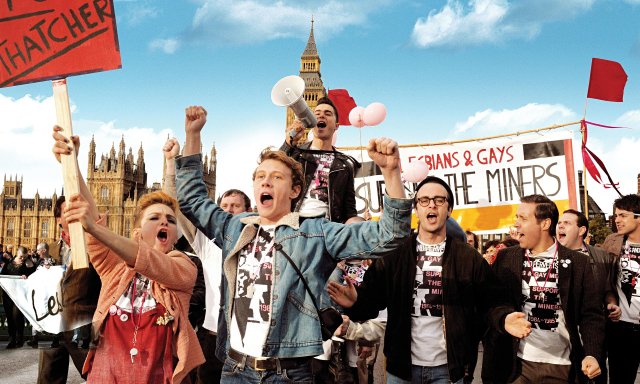
Pride
Directed by Matthew Warchus
Written by Stephen Beresford
Starring Bill Nighy, Imelda Staunton, Dominic West & Ben Schnetzer
In Australian cinemas now
If you haven't seen the recently released Pride yet, you need to get to a cinema. It'll moisten your eyes, swell your heart, make you tap your feet and inspire you to join the next pride parade.
It tells the true story of the birth of the Lesbians and Gays Support the Miners group (LGSM), formed in solidarity with British miners during their prolonged struggle against the Thatcher government. It shows the solidarity the gay and lesbian activists developed with the striking mining community in the small village of Onllwyn in south Wales.
It is an uplifting account of uniting struggles against a common enemy.
Pride is set during the miners’ strike in 1984. Hard-right prime minster Margaret Thatcher led an offensive against miners with an immediate plan to close 20 pits, at the cost of 20,000 jobs.
But as socialist union leader of the powerful National Union of Mineworkers Arthur Scargill warned at the start of the fight, Thatcher wanted to destroy the entire coal industry and the NUM.
At the same time, under Thatcher’s reign, the lesbian, gay, bisexual, transgender, intersex (LGBTI) community suffered police harassment, family disownment, unequal age of consent laws and high rates of street violence.
Homophobia was whipped up by a viscious campaign in the Murdoch press, exploiting the AIDS epidemic among other things. LGSM united “queers and miners against our common enemy ― the Tories, the police, and the gutter press”.
LGSM’s solidarity campaign with the miners included bucket collections, visiting the mining community and organising mining unionists to speak to packed-out queer pubs. Pride follows the progress of the erosion of homophobia in the mining community thanks to LGSM's persistent acts of solidarity.
The campaign is a lesson in tenacity and cooperation. Creating and fermenting divisions among ordinary people is a key tactic of the rich.
By pitting straight against queer, white against black, men against women, they distract us from the real enemy of the poor and oppressed ― the ruling class that owns all the productive capacity of society, and holds all the power.
Revolutionary activist and author Frantz Fanon called it violence of the horizontal ― picking a fight with your downtrodden neighbour. It is a practice that stems from the vertical oppression of the capitalist state.
In the case of the LGSM's solidarity, the bigoted Murdoch propaganda that shamed the mining community for accepting help from “perverts” did not divide the miners, nor scare off the queers. Therein lies the message of the film ― that we must unite, fight with fortitude and not be deterred by set-backs, because if we fight, we advance the solidarity within the working class, even if we don't win the whole fight.
For all the film's many strengths, Pride has weaknesses. First, it obscures the socialist leadership of the campaign. Mark Ashton was a young, gay dynamo who led the LGSM. At a young age, he travelled to Bangladesh and came back to England radicalised.
He joined the Communist Party and became the general secretary of the Young Communist League from 1985.
But as Pride is a work historical-inspired fiction ― produced by BBC Films and Calamity Films ― it is no real surprise the movie obfuscates the fact that the sharp class politics of LGSM was born of socialist inspiration.
The second weakness of Pride is its lack of fully dimensional lesbian characters. For all the positive representation of queers in the film, there is just one lesbian character not subjected to a degree of caricaturing.
By portraying lesbians as divisive radicals who undermined the success of LGSM, Pride relegates the lesbians to a plot obstacle who stand between LGSM and the miners. While this works in favour of reaffirming the need to remain united, it is a missed opportunity to give lesbians some much-needed screentime.
If you want a fuller insight into the LGSM, see the half-hour documentary available on YouTube, Dancing in Dulais. It gives a real feel for the politics of the queer leaders.
A young woman in it says: “I think it’s true to say that LGSM bought socialism onto the agenda of sexual politics in the London gay and lesbian community. But at the same time, it took sexual politics onto the agenda of trade union politics.
“And the existence of the group consolidated a lot of the work that lesbians and gay men have been doing in the labour and trade union movement for years and years.”
A miner’s wife involved in the miners' defence and interviewed in the documentary notes: “You cannot sympathise with an oppressed group until you have been one. And for the lesbians and gays, well we knew if we give them support when they are in trouble, they will give us support as well.”
The movie Pride starts with a pride parade, throws the audience into a year of LGSM organising and ends with a pride parade where conservative organisers try to sideline LGSM with the argument that “we are here to have fun, people want to party, they don’t want politics”.
The conclusion to LGSM winning pole position at the front of the march is a tear-jerker and heralds the victory of a gay and lesbian rights resolution at the Trade Union Conference in 1985.
The conclusion from Pride is that joining in struggle against the rich is heady, exciting and effective. If we fight together and unite we will win a rainbow-friendly, worker-run world.
Like the article? Subscribe to Green Left now! You can also like us on Facebook and follow us on Twitter.